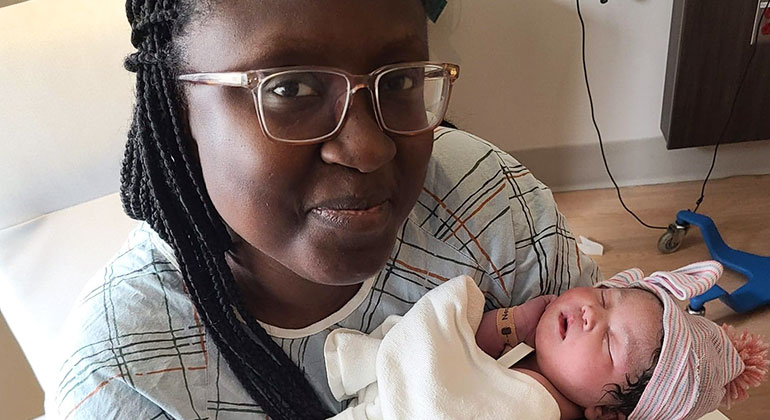
Life After Cancer Brings Another Life
Weslinne Adhemar Cespedes, now 33, was diagnosed with stage 3 breast cancer in her left breast in March 2020. That was just at the start of the COVID-19 pandemic—and she was in the middle of planning a wedding with her fiancé, Emmanuel.
“It was a shock to get this news,” she says.
Weslinne was diagnosed with triple negative breast cancer, a condition that is especially aggressive and difficult to treat. It is more common among Black and young women.
Under the care of Elisa R. Port, MD, FACS, Chief of Breast Surgery and Co-Director of the Dubin Breast Center of The Tisch Cancer Institute at Mount Sinai, and Amy Tiersten, MD, Professor of Medicine (Hematology and Medical Oncology) at the Icahn School of Medicine at Mount Sinai and Clinical Director of Breast Medical Oncology, Weslinne went through a challenging year of treatment. She had 16 rounds of chemotherapy to shrink the tumor, then a lumpectomy to remove what was left. After the procedure, Weslinne had radiation, followed by six months of chemotherapy pills.
Weslinne and her fiancé didn’t give up their marriage plans. On May 25, 2020, about five weeks after Weslinne began chemotherapy, they had a socially distanced ceremony. Weslinne’s 16-year-old daughter was at her side. “My doctors worked with us to arrange my treatment schedule so I would have enough energy for the wedding,” she says.
Because Weslinne was in treatment during the pandemic, she couldn’t bring a friend or family member with her to treatment. So her doctors became her family. “When I was crying, when I felt hopeless, they were there to encourage me, support me, and give me all the resources that I needed,” Weslinne told NBC News 4.
After the surgery, she had a husband and a second chance at life. But she still desperately wanted to have a baby with her new husband. Chemotherapy had taken away her menstrual cycle, but it started up again once she finished treatment. Before starting therapy, Weslinne had thought about freezing her eggs, but couldn’t. “This was at the height of the pandemic, and the fertility preservation centers were pretty much closed down,” explains Dr. Tiersten. Weslinne adds: “We thought about waiting until I could freeze my eggs, but we didn’t know how long that would be. And delaying my treatment could be risky.”
Once she finished treatment, Weslinne started to think again about having a baby. COVID-19 restrictions had lifted somewhat, and Weslinne decided to get her fertility checked. She saw a fertility specialist who took a medical history and did blood work and a transvaginal ultrasound. A few days later, Weslinne got a call from the specialist’s office. “They said, ‘Your fertility levels are way up—you’re pregnant’,” Weslinne says. “I was so excited.”
But she was also nervous: “When you’re pregnant, you can’t get a mammogram, and I needed to be checked regularly.” She was concerned about all the treatment she had received: “I kept wondering if the baby was okay.” She searched on social media for stories about young women with breast cancer; it was reassuring to read about success.
Weslinne was diligent about breast self-exams. She also saw her breast surgeon, Dr. Port, and her medical oncologist, Dr. Tiersten, every three months. Eventually, they cut it back to every six months, but she will continue to check in with her doctors for the rest of her life. She also discussed her concerns with her OB/GYN, Robin Brown, MD, Assistant Professor in Obstetrics, Gynecology and Reproductive Science at Icahn Mount Sinai.
After all the uncertainty, in March 2023 Weslinne gave birth to a healthy, beautiful little girl, whom she named Anais. “I'm really proud of being able to breastfeed her. I had a lot of anxiety because my body had failed me,” she explains. Weslinne pumps from the affected breast and feeds Anais with the other. “That breast is working overtime,” she laughs.
When Anais turned two months old, Weslinne took her to meet the Mount Sinai doctors who had been her surrogate family. The doctors were thrilled, too. “It was really exciting and inspiring to see her with her baby,” says Dr. Tiersten.
Weslinne was touched. “When I look at them, I think about everything coming full circle and basking in the blessings that life has given me. I fought to be here, and so I just want to be the best mom I can.”
“I’m a Mount Sinai patient through and through,” Weslinne says. Her primary care physician, obstetrician/gynecologist, and pediatrician are all at Mount Sinai. “They’re like family.”